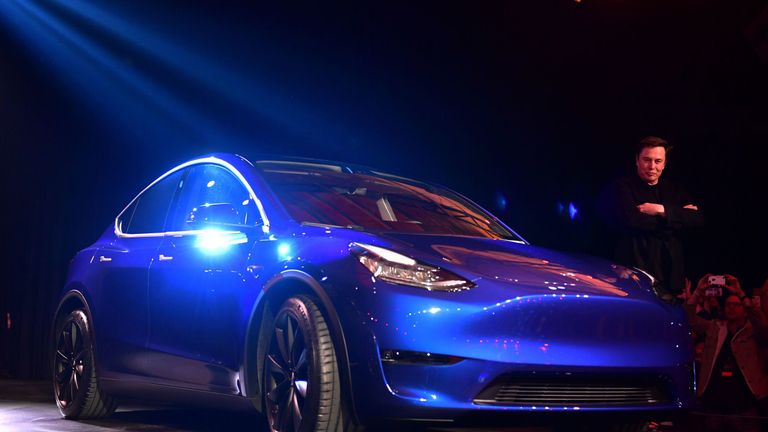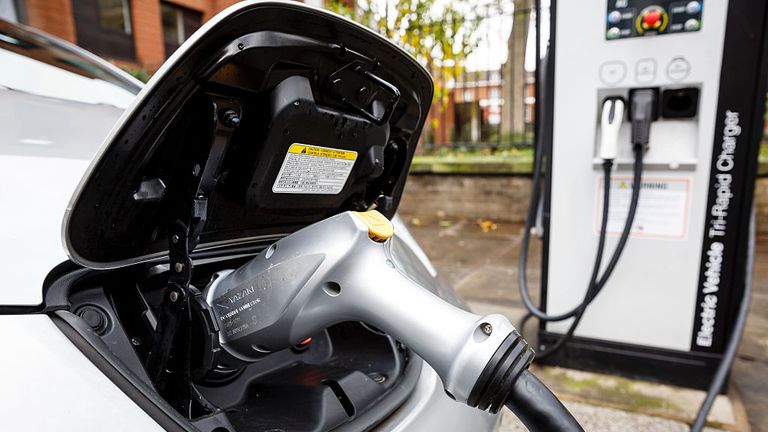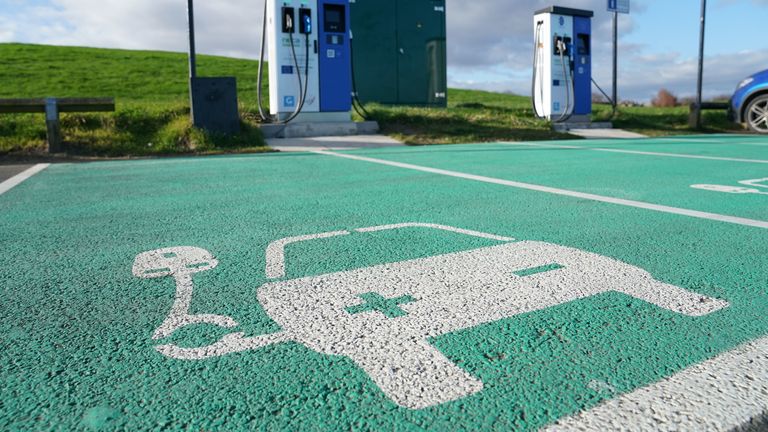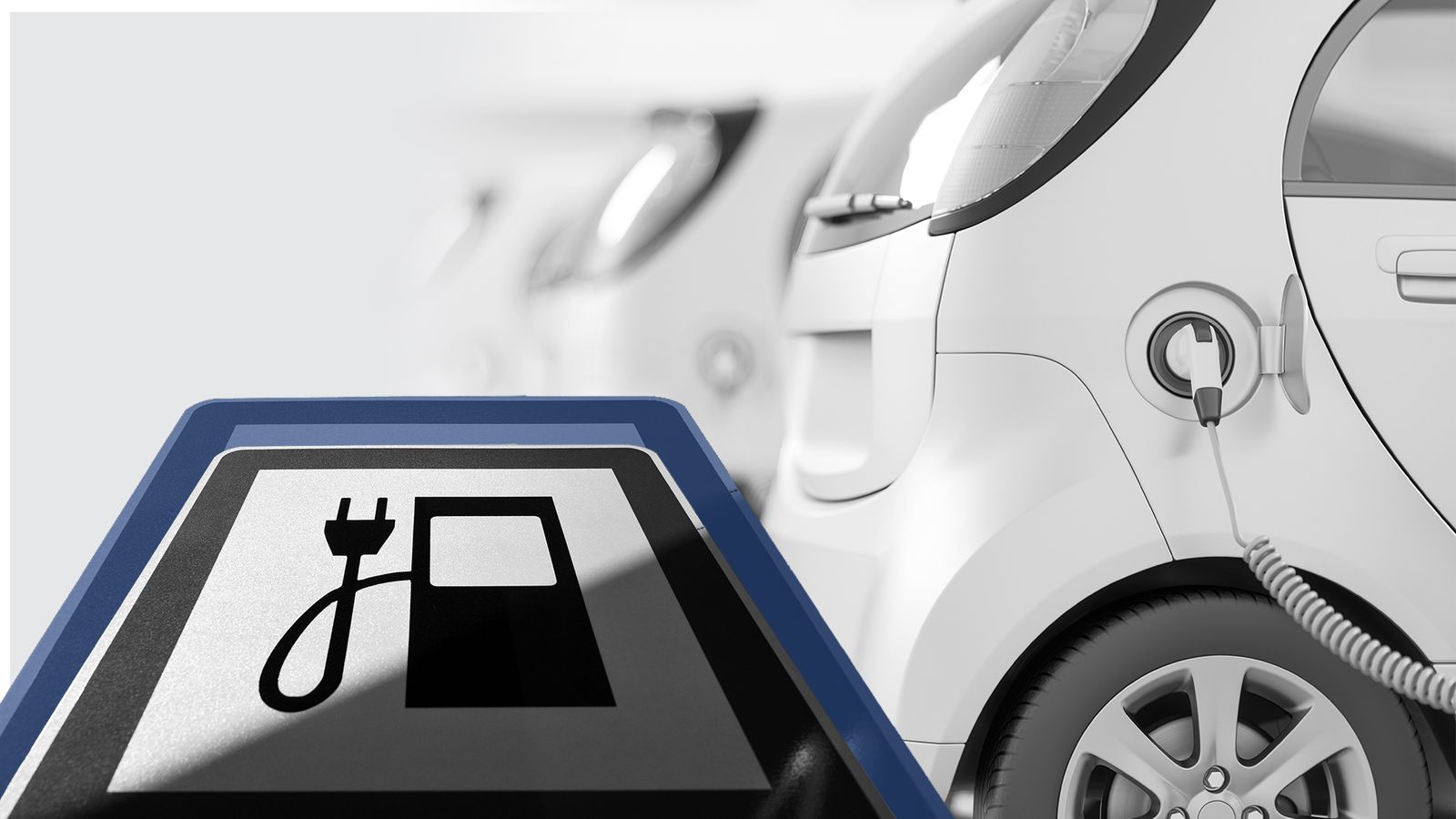As the prime minister confirms plans to ban the sale of new petrol and diesel cars by 2030, Sky News looks at the pros and cons of switching to electric.
The ban had been initially been planned for 2040, then 2035 (the date hybrid cars will be banned), but has now been brought forward again to 2030 under a new government plan to tackle climate change.
Transport accounted for a third of all UK greenhouse gas emissions in 2018 and environmentalists say there is a clear need to cut down on vehicle emissions. But just how good are electric vehicles?
How much does an electric car cost?
Electric cars can be a more expensive initially. Costs range from around £15,000 all the way up to £100,000+ for high-end models.
However, there is a government plug-in car grant which reduces the price by £3,500.
There is also a grant of up to £500 towards the cost of a home charger.

How much do they cost to run?
Much of the initial outlay of an electric car can be recouped with lower monthly bills.
Charging them works out significantly cheaper than filling a car with petrol or diesel.
According to the AA, on average an electric car costs about £2 to drive 100 miles, with the petrol equivalent £11.60.
Servicing and repair costs could also be less as electric cars have fewer moving parts.
There’s also no road tax to pay for electric vehicles costing less than £40,000.
However, insurance is currently higher for electric vehicles because of limited options for fixing them compared with traditional cars.

What is the range of an electric car?
This can vary and also depends on where and how you drive.
For example, accelerate gently and use air-conditioning or heated seats sparingly and you should go further.
Without taking these factors into account, there is a wide difference – with a starting point of around 115 miles up to around 380, depending on model.
Performance wise, electric cars can accelerate very quickly because unlike conventional engines they produce maximum torque straight away.
Where can I charge my car?
There are more than 30,000 points currently in the UK in over 11,000 locations.
Around 10,000 charge points were added in 2019 alone.
Research by Deloitte suggests the UK will need to spend £1.6bn on 28,000 more public points for the estimated seven million EVs that will be on the road by 2030.
How long will it take to charge?
There are three speeds of charging points: slow, fast and rapid.
A slow charging point will take eight to 10 hours and is intended to be used overnight or at a workplace.
Fast chargers will take three to four hours, while rapid ones take 30-60 minutes – although not all electric cars have the capability to use rapid chargers.
How popular are electric cars?
In 2019, there were 37,850 BEVs (Battery Electric Vehicles) registered – up 144% on the previous year.
However, they still only account for 1.6% of the market.
Hybrid electric vehicles are currently more popular, making up 4.2% of the market share, but they are set to be phased out with petrol and diesel cars by 2035.
Hybrids combine an electric motor with a petrol or diesel engine.

How environmentally friendly are they?
With no emissions out of an exhaust, electric cars are great for reducing pollution in cities.
There are issues however with pollution created by producing the electricity in the first place, but this varies.
A wind farm is vastly cleaner than a coal-fired power station and some energy companies offer “green” tariffs, using electricity produced from sustainable sources.
Manufacturing an average petrol car will involve emissions of around 5.6 tonnes of CO2, while for an average electric car that rises to 8.8 tonnes, according to estimates by the Ricardo consultancy.
However, it says over its whole lifecycle the electric car would still produce 20% less emissions.
What are the other costs and drawbacks?
Battery technology remains the biggest limitation for electric vehicle companies – and a typical electric car battery requires up to 20 pounds (9kg) of cobalt, much of which is sourced from the Democratic Republic of Congo (DRC).
When a Sky News team visited a string of mines in the DRC’s former Katanga Province, it found children working at all of them.
At one cobalt mine, children were found toiling in the drenching rain carrying huge sacks of the mineral.
One boy called Dorsen, who was eight years old, had no shoes and told Sky News he hadn’t made enough money to eat for the past two days – despite working for about 12 hours a day.
